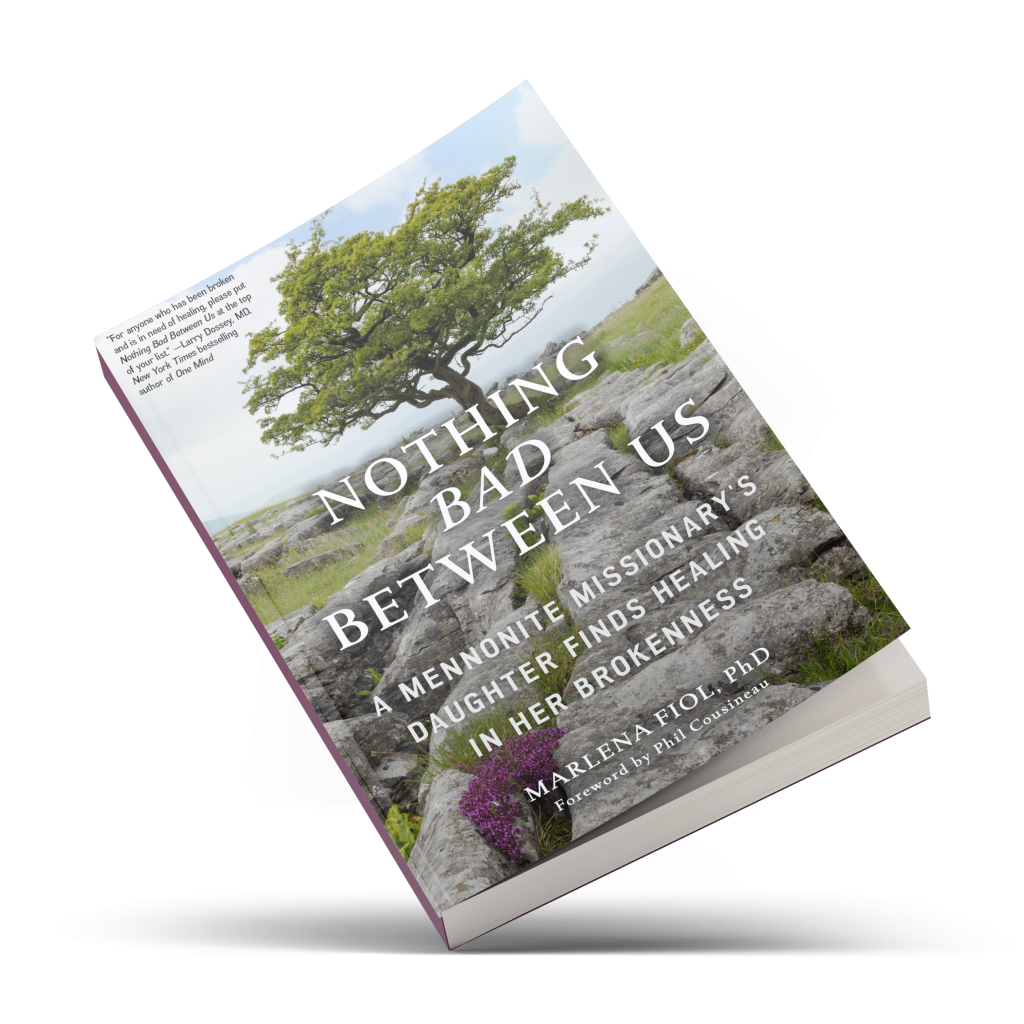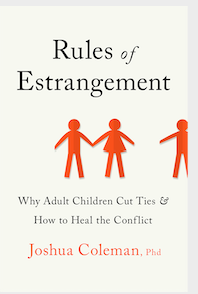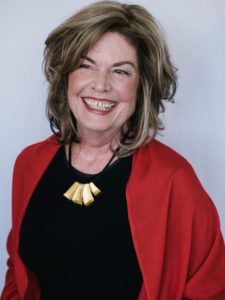Welcome to Our New Series:
Choosing Compassion Over Fear
My own personal journey from a rebellious and tortured childhood to eventual healing and reconciliation depended on gradually learning to choose compassion over fear. You can read about it in my new book Nothing Bad Between Us, which is now available at your favorite bookseller.

Choosing Compassion Over Fear:
The Path to Joy
featuring Dr. Joshua Coleman

As part of our ongoing series, Choosing Compassion Over Fear, I am featuring some of our most cherished friends and colleagues to discover how they have navigated the landscape of doubt, insecurity, tragedy, and fear to move toward becoming their truest selves. Today, we are honored to bring you a special excerpt from Dr. Joshua Coleman’s book, Rules of Estrangement: Why Adult Children Cut Ties and How to Heal the Conflict. Josh is a psychologist in private practice in the San Francisco area, with particular expertise in family dynamics, including estrangement.
The Path to Joy
When I became a psychologist, I could not have predicted my practice would one day be filled with parents suffering from ongoing, unrelenting grief. That I would need to grapple with ques- tions like: What if I never see my child ever again? What if my grand- children think that I don’t love them? Does my son remember any of the wonderful times that we had together? Does my daughter still care about me if she’s decided she won’t see me? Or does she just hate me?
I also didn’t know that I would have to address heartrending end- of-life issues such as: Who will bury me? Will I die alone in a hospital bed with no children or grandchildren to comfort me? Will my children even miss me once I’m gone? If I get cancer will they finally end the estrange- ment? How will I feel if they won’t?
Nobody trained me for these questions, and I’m sure I responded clumsily and ineffectually the first few years that I began to be flooded with referrals after writing When Parents Hurt. But after working with so many estranged parents over the past decade, here’s what I’ve learned. To start: There’s nothing I can do or say that will take away your pain. You’re going to see a grandmother push her granddaugh- ter down the street with her daughter smiling by her side and feel pain. You’re going to listen to your friend or relative tell you about the fantastic trip they all went on with their three adult children and their grandchildren and feel pain. You’re going to wake up from a dream where your son blissfully reconciled with you, remember you’re heading into year seven of no contact, and feel pain. Despite your strongest inner warnings, you’ll go again to your child’s Facebook page or Instagram or wherever the hell they post pictures of themselves, their children, their in-laws, their friends—seemingly everybody but you—and feel pain.
Here’s what else I’ve learned: It’s what you do with the pain that will make the difference between a life tethered to constant, implacable sorrow and one that has joy and meaning along with the pain.
“The path out of hell is through misery,” writes University of Washington psychologist and researcher Marsha Linehan, the founder of Dialectical Behavior Therapy. “By refusing to accept the misery that is part of climbing out of hell, you fall back into hell.”
The path out of hell is through misery. Excuse me? What is that supposed to mean? It means that you have to start by “radically accepting” where you are right now. Radical acceptance means that you don’t fight what you’re feeling in this moment. You feel sad? Feel sad. Don’t judge it, don’t push it away, don’t diminish it, and don’t try to control its passage. Turn toward the feeling rather than turn away from it.
I learned this lesson the hard way. When I was going through my estrangement, I found myself daily rehearsing every parental mistake I’d ever made and winding up in the same pool of sadness, anger, and fear. However, one day, instead of continuing to bathe myself in the deadly font of those feelings, I thought: “Hey, guess what? Your daughter may never talk to you again. Ever! Last time you saw her? That may be the last time you’ll ever see her. Deal with it.” It wasn’t a harsh or critical voice—more like wise and caring counsel from some censored part of me. And the acceptance of that gloomy reality was oddly, paradoxically reassuring. That’s radical acceptance. It’s accepting what you cannot change in this moment and may never be able to change.
Here’s another example: Psychotherapist Megan Devine tragically watched her partner drown at the beach when he was thirty-nine. She knows a lot about the geography of pain. This is what she advises: “Your pain needs space. Room to unfold,” she and Mark Nepo write in It’s OK That You’re Not OK: “Maybe your pain could wrap around the axle of the universe several times. Only the stars are large enough to take it on.”
The path out of hell is through the misery of accepting where you are right now. Right now, you’re reading this because you’re desperate, you’re angry, you’re guilt-ridden, worried, ashamed, scared, and scarred. These are powerful messages from your mind: There’s something here you should be attending to and not judging.
You might think, “But I’m already attending to it. That’s the problem!” True, but there’s a right and a wrong way to attend to our thoughts and feelings. I’ve found that it’s useful to distinguish be- tween pain and suffering, because pain and suffering are two different things. Pain is the inevitable and unavoidable part of being human and of being an estranged parent. Unfortunately, you have relatively little control over that. However, you can gain increasing control and awareness over how long you feel pain. You can reduce the meaning of it, the actions you take that increase it, and the distance the pain travels through other aspects of your life. That’s the suffering part.
The difference between pain and suffering is an insight that found its way from Buddhist teachings into contemporary psychotherapy. Psychiatrist Mark Levine, who developed the Mind to Mindful program, gives this example: “Let’s say I stub my toe walking across the kitchen floor and it really hurts. That’s pain. But then I start telling myself a bunch of things about stubbing my toe such as ‘You idiot, why don’t you watch where you’re going?’ Or ‘Next time you’re going to fall flat on your face or break your hip!’ Or ‘This is so typical of you to be so clumsy. Just one more example of what a screw-up you are!’
That’s suffering. Suffering lengthens the experience of pain because it creates an endless cognitive feedback loop where pain is always its terminus. Where suffering begets suffering begets suffering.”
Here’s a more relevant example: You go to a dinner at your friend’s house where their adult children are visiting from out of town. These are kids you grew up with, so you’re happy to see them and they’re happy to see you. And these are your close friends, so it makes you glad to see them with their thriving, successful children. And devastatingly sad because of the mirror it holds up to all that you’ve lost. So you end up excusing yourself multiple times throughout the evening to go to the bathroom and sob into your hands so no one will hear you.
Pain in this example are the feelings of sadness and loss. Suffering would be any of the following:
- Shaming yourself: I must be a terrible person/terrible parent for my own child to have turned against me
- Societal shame: Others must think I’m terrible that my own child would turn against me
- Social isolation: (related to societal shame) I shouldn’t even leave the house if this is what’s going to keep happening to me.
- Fear and catastrophization: How can I survive the pain if this never resolves? How can I survive the pain of not seeing my child or grandchild?
- Guilt and rumination: I can’t stop thinking of all of the ways that I may have created this problem or what I should be doing to fix it. I also can’t stop thinking about how hurt and mistreated I feel by my child.
- Rage: How can my own child do this to me? Who do they think they are?
- Envy: Why do others get to spend time with their children and grandchildren and I don’t?
- Vestiges of the past: How can I tolerate the pain of my own child rejecting me when my own parents didn’t love me? Doesn’t this prove I’m unlovable?
It’s also helpful to get into the granularity of your emotions. Is it just sadness? Or is it actually despair, grief, misery, agony, rejection, insecurity, sorrow, or defeat? Is it just anger? Or is it actually resentment, rage, irritation, jealousy, annoyance, or bitterness? Why should you get more specific? Psychology professor, and author of How Emotions Are Made, Lisa Feldman Barrett found that higher emotional granularity was associated with lowered needs for medication, fewer hospitalization days for illnesses, and greater flexibility regulating emotions. Getting into the specifics of what you’re feeling helps you hear the message one part of your mind is trying to deliver to another part. It can guide you to determine the course of action in response to that emotion. It can help you to feel less ruled or controlled by your feelings because you’ll know more specifically what you’re feeling.

*****
About Josh
About Josh:
Dr. Joshua Coleman is an internationally known expert in parenting, families and relationships. He is a psychologist in private practice in the San Francisco Bay Area and a Senior Fellow with the Council on Contemporary Families, a non-partisan organization of leading sociologists, historians, psychologists and demographers dedicated to providing the press and public with the latest research and best-practice findings about American families. He has lectured at Harvard University, The University of California at Berkeley, The University of London and Cornell Weill Medical School. He has weekly webinars for estranged parents and blogs on parent-adult child relationships for the U.C. Berkeley publication, Greater Good Magazine.
Find Josh on Online:
https://www.drjoshuacoleman.com/ (Website)
https://www.facebook.com/DrJoshColeman/ (Facebook)
https://twitter.com/drjcoleman (Twitter)
https://www.linkedin.com/in/drjoshuacoleman (LinkedIn)
Josh’s Book:
Rules of Estrangement: Why Adult Children Cut Ties and How to Heal the Conflict (March 2021)
Choosing Compassion Over Fear
Join Me
If you wish to engage with me in exploring ways we can move toward compassion rather than fear, I invite you to tune in at marlenafiol.com for bi-weekly blog posts and podcast episodes covering a wide range of perspectives, from finding your true calling, to healing estranged family ties. Participants include Jonathan Reckford, CEO of Habitat for Humanity, and Tom DeWolf, Program Manager of Coming to the Table, among many others. The series begins on September 21, 2020 and will run through the first week of December.
Remember, we are together on this journey.
— Marlena



